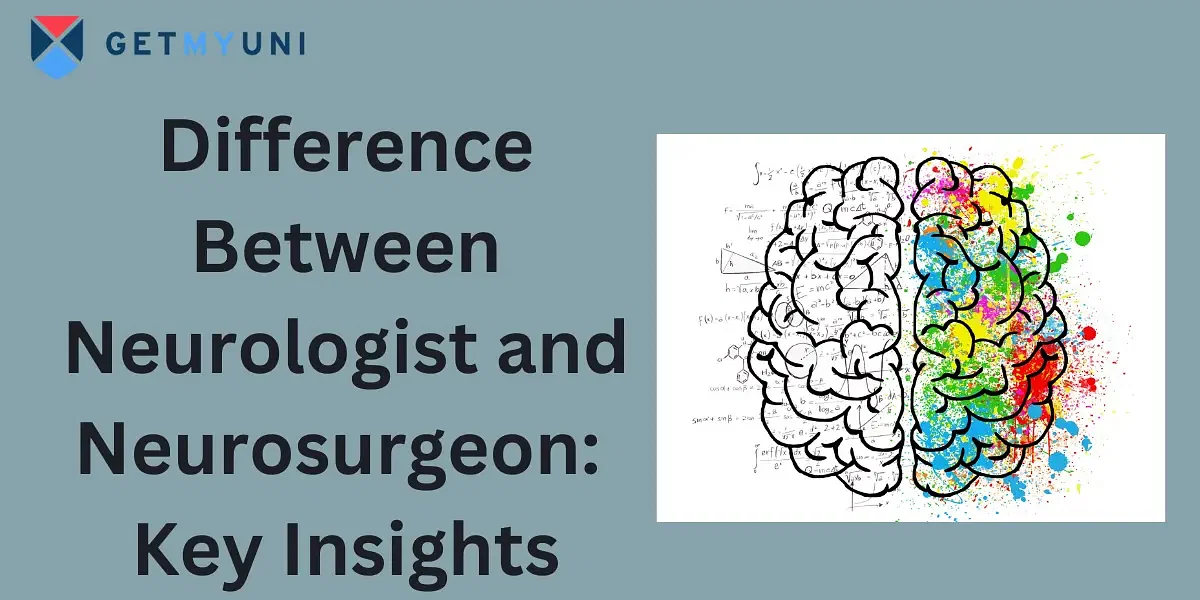The basic difference between Neurologist and Neurosurgeon is the former diagnoses the disease by performing multiple checkup and treats the ailment whereas later performs the surgery upon recommendation by the Neurologist.
Table of Contents
Difference Between Neurologist and Neurosurgeon: The fundamental difference between neurologists and neurosurgeons is that neurologists diagnose and treat problems in the neurological system. Neurosurgeons perform surgery to manage medical issues, while neurologists do not.
Neurologists focus on diagnosing complicated neurological conditions that require close observation, additional medication, or other forms of treatment. If surgery is needed to treat the illness or enhance function, the neurologist will refer the patient to a neurosurgeon.
The main differences between a neurosurgeon and a neurologist should be clear. While neurologists treat certain disorders with drugs and other methods, neurosurgeons may perform surgery to treat the ailment.
Neurologists and neurosurgeons perform complementary tasks. When a patient has a disease, a neurologist will treat them long-term while recommending that they consult a neurosurgeon for surgery.
Difference Between Neurologist and Neurosurgeon
The primary difference between the neurologist and neurosurgeon on multiple parameters such as medical degree, undergraduate education, medical school, internship and residency training in the table added below:
| Parameters | Neurologists | Neurosurgeons |
| Medical Degree | Doctor of Medicine (M.D.) or Doctor of Osteopathic Medicine (D.O.) | Doctor of Medicine (M.D.) or Doctor of Osteopathic Medicine (D.O.) |
| Undergraduate Education | Completion of a 4.5 year MBBS program | Completion of a 4.5 year MBBS program |
| Medical School | Recognised by Medical Council of India | Recognised by Medical Council of India |
| Internship | 1-year internship in general medicine or internal medicine | 1-year internship in general surgery or medicine |
| Residency Training | Completion of a 3-year residency program in neurology | Completion of a 7-year residency program in neurosurgery |
| Fellowship (Optional) | 1-2 years of fellowship training in a subspecialty of neurology | 1-2 years of fellowship training in a subspecialty of neurosurgery |
Also Check: Top 15 Different Types of Doctors in India
Who is a Neurologist?
A neurologist treats illnesses and disorders of the brain and neurological system and can undertake a range of tests and procedures, such as neurological examinations, imaging investigations (such as MRI and CT scans), electroencephalograms (EEGs), electromyography (EMG), and nerve conduction studies, to aid in the diagnosis and treatment of these illnesses.
- It's important to remember that neurologists frequently collaborate closely with other medical specialists, including neurosurgeons, physical therapists, occupational therapists, and speech therapists, to provide comprehensive care to patients with neurological diseases.
They are qualified to identify and handle a variety of ailments, such as but not restricted to:
- Multiple sclerosis, Parkinson's disease, Alzheimer's disease, epilepsy, and other types of dementia are examples of neurological illnesses.
- Peripheral neuropathy, myasthenia gravis, and muscular dystrophy are examples of neuromuscular disorders.
- Migraines and headaches: Severe and chronic types included.
- Stroke: Hemorrhagic (resulting from bleeding) and ischemic (resulting from a blood clot).
- Movement disorders: This includes restless legs syndrome, dystonia, and tremors.
- Disorders related to seizures: This includes epilepsy and various forms of seizures.
- Attention-deficit/hyperactivity disorder (ADHD) and autism are examples of neurodevelopmental disorders.
- Traumatic brain damage and spinal cord injury are examples of neurological injuries.
Who is a Neurosurgeon?
The idea that neurosurgeons only perform brain surgeries is a frequent one; however, compared to brain diseases and treatments, spine conditions and procedures usually receive far more attention from neurosurgical specialists.
- Back pain, neck pain, sciatica, ruptured disks, degenerative diseases of the spine, cerebrovascular disorders, brain and spinal malignancies, and stroke are among the common illnesses that neurosurgeons treat.
- Furthermore, because the nerves branch out across the entire body and the nervous system runs from the brain to the spine, they can treat illnesses whose symptoms originate in one area of the body but are actually caused by a problem with the central nervous system.
- Neurosurgeons generally use non-operative treatment strategies prior to surgery, even though they are capable of doing exceedingly complex surgeries.
Also Check: How to Become a Doctor in India?
Neurologists vs Neurosurgeons: Roles and Responsibilities
The differences between Neurologists and Neurosurgeons in roles and responsibilities are listed below:
- Practice Area: Neurosurgeons are qualified to operate on the neurological system and treat conditions that need to be surgically resolved. Conversely, neurologists focus on using non-surgical techniques to diagnose and treat neurological problems.
- Training and Specialisation: While neurologists receive training in internal medicine and neurology with an emphasis on the medical therapy of neurological diseases, neurosurgeons finish rigorous surgical training and fellowships focused on neurosurgery.
- Treatment Strategy: A neurosurgeon's treatment strategy usually includes performing surgery to fix or relieve issues. On the other hand, neurologists treat and manage neurological illnesses without surgery by means of medication, lifestyle modifications, and physical therapy.
- Patient Care: When a patient has a condition that calls for urgent or sophisticated surgical intervention, neurosurgeons are frequently consulted. Typically, neurologists provide comprehensive care regimens, including non-surgical therapies, and oversee the long-term management of neurological diseases.
Read More: Master of Surgery
Differences in Treatment: Neurologist vs Neurosurgeon
The conditions that each specialist treats are another critical distinction between a neurologist and a neurosurgeon. The differences between Neurologists and Neurosurgeons in treatment methodologies are added below:
- Treatment of neurological diseases such as epilepsy, Alzheimer's, peripheral nerve problems, and ALS is the area of a neurologist. Neurosurgeons, on the other hand, treat carpal tunnel syndrome, brain traumas, and tumour removal. In order to treat patients effectively, the two practitioners collaborate closely, combining surgical and medicinal methods as needed.
- Another significant distinction between a neurologist and a neurosurgeon is the problems that each expert handles. Neurologists are interested in the treatment of neurological disorders such as ALS, Alzheimer's, epilepsy, and difficulties with peripheral nerves. On the other side, neurosurgeons handle tumour removal, brain damage, and carpal tunnel syndrome. The two medical professionals work closely together to treat patients, integrating surgical and pharmacological techniques as needed.
- These two medical specialisations and the diseases they treat have certain similarities. When surgery is necessary (for example, to treat a brain tumour), these medical specialists may collaborate; a neurologist may refer a patient to a neurosurgeon for surgery.
Read More: Doctor of Medicine
Similarities Between Neurologist and Neurosurgeon
The differences between neurologists and neurosurgeons are mentioned above, but as we understood that these two professions are interconnected so, the similarities between them are added below:
- Neurology is a field of specialisation for both neurologists and neurosurgeons. It is concerned with the diagnosis and management of diseases of the neurological system.
- Advanced Training: Following medical school, neurologists and neurosurgeons receive in-depth training specific to their professions.
- Diagnostic Proficiency: Both careers require the ability to execute specific tests, interpret imaging studies (such as CT and MRI scans), and conduct neurological examinations to assist in the diagnosis of neurological diseases.
- Collaborative Approach: When treating patients with complicated neurological diseases, neurologists and neurosurgeons frequently collaborate closely. They create thorough treatment programs and decide whether surgery is required.























POST YOUR COMMENT